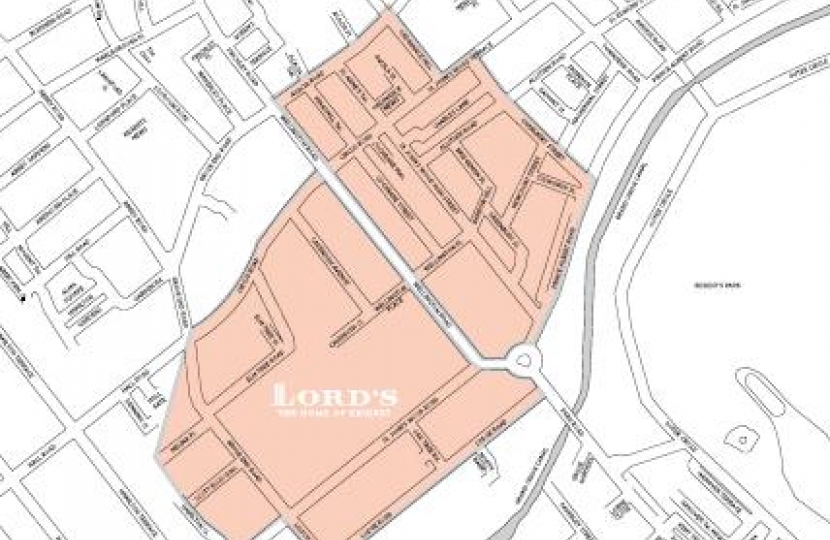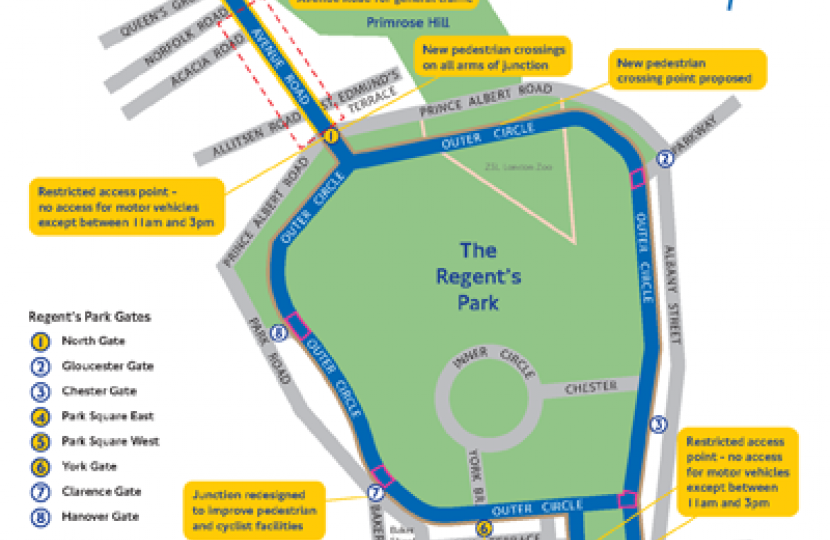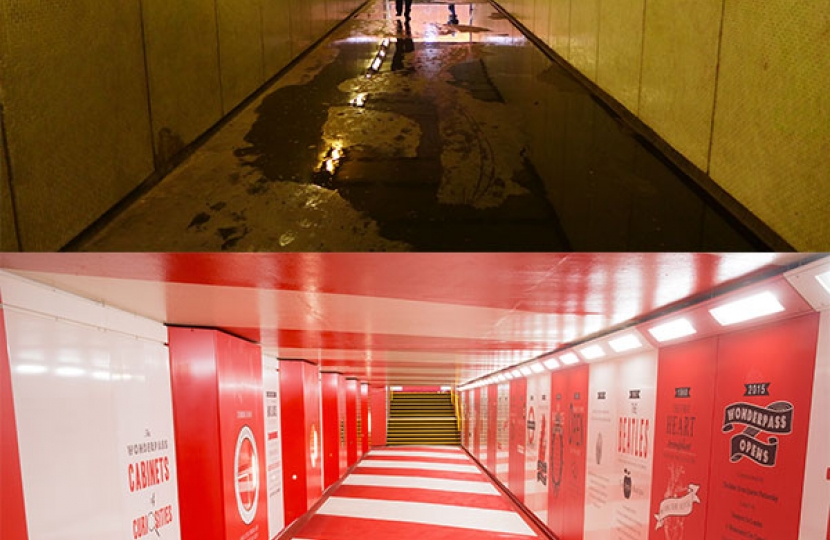Lord's Parking zone
There are now further restrictions on parking around Lord’s Cricket Ground on weekends and Bank Holidays of major match days (Test, One Day International, T20, National & International Final matches) in order to protect residents parking starting this month.
Your local Councillors have listened to the concerns of residents who have complained of the difficulty finding parking places on major match days due to the influx of spectators.
A new zone to the east of the Wellington Road has been designated in a similar manner to the ten roads which already have restrictions to the west of the Wellington Road whereby these bays are protected from 8.30 – 18.30 with flap-down signs.
Visitors will still be able to visit but will only be allowed to park on single yellow lines. All other parking controls in the area remain unchanged.
Please see details of the parking restrictions.
Regent’s Park Councillors continue to lobby for the interests of residents on CS11
Thank you to all those residents who took part in the consultation and attended the public meetings organised by your local Councillors in relation to the proposed new cycle superhighway CS11 planned to cut through St John’s Wood.
The scheme generated a lot of interest and resistance owing to the plan to close the gates into Regent’s Park and change the layout to the Swiss Cottage gyratory which would result in a displacement of traffic within NW8. Combined with the impact of other major projects in the area including HS2, the development at the Barracks, Lord’s Cricket Ground and Baker Street 2-way, residents rightly felt this would bring more congestion, resulting in rat running throughout St John’s Wood.
We now await the official results of the consultation from TfL and the views of the new Mayor of London who will ultimately be responsible for its outcome. You can be assured your Regent’s Park Councillors will continue to be lobbying for the interests of our residents.
Wonderpass 'transformed' says Evening Standard
The subway under the Marylebone Road by the Globe Pub and Baker Street Station, the most southerly point within Regent’s Park ward has been reopened after an extensive refit and upgrade and has been renamed 'The Wonderpass'.
This community collaboration project involved the Baker Street Partnership, TfL and your local ward councillors working together to have this space transformed. It now has images and displays of local favourite attractions including Madame Tussauds and the Regent’s Park Open Air Theatre.
The Evening Standard has described it as ‘transformed’ and since its opening it has seen an 83% increase in footfall. To ensure it remains in good condition, its gates are locked from 20.30 – 06.00 daily with a full clean taking place every night.
Westminster Makes History With ‘Outstanding’ Children’s Services
Conservative-run Westminster City Council has made history as the first authority in the country to receive an ‘outstanding’ rating from OFSTED for its Children’s Services.
OFSTED said that Westminster’s Children’s Services Department showed ‘exemplary application’ of the ‘focus on practice’ model and praised the Council for its leadership, innovation and expertise in this area.
Inspectors commented that some of the innovative work they saw at Westminster will be used as an exemplar for other authorities to drive up standards across the country.
Cabinet Member for Children & Young People, Councillor Danny Chalkley, said: ‘I am very proud that Westminster is leading the way on Children’s Services and I think that OFSTED’s rating is testament to the excellent team we have in place and the exceptional work that they do for our children and young people across the Borough’.
Deputy Cabinet Member for Children & Young People, Councillor Paul Church, said: ‘Westminster’s outstanding OFSTED for our Children’s Services shows that this Council doesn’t only make history, it makes futures, too, for all of the children and young people that we serve right across the Borough’.
Prioritising Cleaner, Safer Streets
Conservatives in Westminster have welcomed a 16% reduction in litter on Westminster streets and 85 new schemes of work to be carried out on carriageways and footways. The Council has also allocated specific funds for repairing gulleys and potholes in the city.
Residents have noticed a positive difference with litter complaints down by 27%. The results have also been endorsed by the Independent Group 'Keep Britain Tidy' which shows Westminster compares very favourably as compared to other council's in London.
The Council has managed to increase efficiencies by improving back office functions and moving toward a ‘digital city’ model, with 75% of services now available online. Bulky waste collection saw a 25% increase since going digital and webforms now make up 45% of reports to the council.
Westminster introduces its Community Infrastructure Levy
Westminster City Council implemented its Community Infrastructure Levy (CIL) on 1 May 2016 to supplement s106 agreements. This is a fixed charge on development to help fund infrastructure such as transport schemes and schools which the council, local community and neighbourhoods require to help accommodate new growth from development.
The CIL is to be charged on a square metre rate of net additional floor space created if the development creates 100 square metres or more of net additional floorspace.
The key drivers of the CIL charge for a development are:
- If the development is in an area deemed prime, core or fringe
- the rates within the tariff adopted and
- the use of the property
Mindful of the ever changing nature of Westminster, the Council will review its CIL biennially with the first review in 2018. This simple, straight forward policy would allow developers greater clarity as to the receipts due to the council. A specified portion of proceeds generated by development in each neighbourhood will be spent on priorities agreed with the local community. Specifically 15% of funds will be directed within neighbourhoods without a neighbourhood plan, rising to 25% uncapped in neighbourhoods with a neighbourhood plan. Westminster has set out a draft list (known as a ‘Regulation 123 list') of infrastructure projects or types of infrastructure that CIL receipts will be used to fund. This list will therefore be a key driver in the development of necessary infrastructure within Westminster and includes crime and anti-social behaviour; education facilities; health facilities and public realm improvements amongst others.









